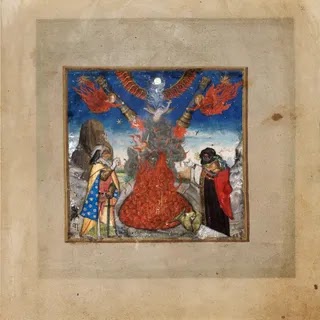The rappers deliver an album filled with serpentine, enigmatic stories and gloomy beats. It doesn’t have the gloss and pomp of their best work, but it highlights the pair’s complementary gifts.
Mach-Hommy isn’t just looking to control his narrative; he keeps it under lock and key. Very little about the Haitian-American rapper’s life is public knowledge, and whatever specifics he offers in songs and interviews usually produce more questions than answers. Still, there’s a meticulousness to his antics. He sells his own albums for $444; he uses lyrics about the importance of a Gore-Tex jacket to convey particular eras of time; he offers piecemeal details about his past in magazine cover stories. His grip has loosened slightly since he’s done more press and released a good chunk of his discography on streaming platforms, but he still relishes the distance afforded to him by his mask and microphone. “We doin’ donuts with somebody A6/Don’t none of this shit belong in Page Six,” he says with cheeky disdain on “Bad Hands,” the second track from his latest album, Notorious Dump Legends: Volume 2. It doesn’t have the gloss or pomp of 2021’s Pray for Haiti or Balens Cho (Hot Candles), but Mach’s mystique and lyrical skill keep the music unpredictable.
Like the 2018 release that kicked off the Notorious Dump Legends series, the second volume is a team-up with Atlanta rapper-producer and frequent collaborator Tha God Fahim, who appears on all but one song. On a technical level, their forms complement each other well. Mach is a Swiss Army knife, capable of switching flows and languages on the fly while busting out lyrics both tuneful and blunt (“Two L’s make a dub in this cold milk” on “Cold Milk” or “Heard none of you niggas’ weed plates” on “Pissy Hästens”). Fahim is the grounding voice who arrives with straight punchlines and life advice, adhering strictly to the beat. On “Pissy Hästens,” an agitated Mach’s voice slowly turns into a growl, embodying the frustration he experiences when people mispronounce his name. Through it all, Fahim’s workmanlike rhymes anchor the Jersey rapper’s erratic thoughts. Occasionally, Fahim matches Mach’s energy and the two enter a sparring contest; “Olajuwan” and “Everybody (Source Codes)” contain two of Fahim’s most energetic verses ever, his voice briefly rising above his usual nasal monotone. When they rap together, Mach and Fahim adapt to each other’s changing tides like a constantly morphing yin-yang.
Despite the reciprocity, this is ultimately Mach’s show. He has the more exciting vocal turns, the more slippery flows, and his bars have the highest stakes. You can hear it in his croons about the “Sour Patch Kids writing pieces on me daily;” in his stories of seeing enemies relax on the same beach as him; or in the way he transitions from English to Patois and Kreyòl mid-song, as if he’s swiping between apps on a phone. It’s hard not to get caught up in the mythmaking at the end of “Olajuwan,” as Mach clears his throat in grand fashion: “His last shit became public domain as soon as he spit it/He a wizard, his name is Mach-Hommy, he the illest.” For all his cultured poeticism, Mach loves a good flex as much as any rapper. Volume 2 doesn’t stray far from that sensibility, another excuse for him to reflect on his life and good fortune—and for him and Fahim to burrow deeper into their own legends.
To continue the Dump Legends tradition of shadowy, creaky beats, the duo enlists a handful of usual suspects from the contemporary underground. Philadelphia’s SadhuGold expands his range with the wonky horn and drum loop that gives “From Vailsburg to Vaudeville” its warped aesthetic, as well as the hazy string plucks and somber drum march that rumble in the background of “Olajuwan.” New York’s Fortes and Detroit’s Denmark Vessey stand out with two of the fullest arrangements on “Niggas Sooooo Good” and “Nan Dezo,” respectively. Shimmering pianos and hand drums establish the foundation of the former, while the chimes, violin strings, and breathy tongue clicks of the latter convey an aura of Gothic horror. They’re nothing revolutionary, but they’re atmospheric enough to give Mach and Fahim a more chilling presence.
In the third of a series of recent cover stories for The FADER, Mach was asked what he would rap about if he were a billionaire. He responded in the most Mach-Hommy way possible, using the third person: “He wouldn’t.” He’s reached a point in his career where he’s selling mystery vinyl packages for a thousand dollars and impressing Jay Electronica and Beyoncé in the booth. For the time being, he seems content to rap circles around the competition, just because he can. Notorious Dump Legends: Volume 2 captures enough of the verve and strategically enigmatic storytelling that make up Mach’s best work—adding another patch to the vast and layered collage of his music.



0 comments:
Post a Comment